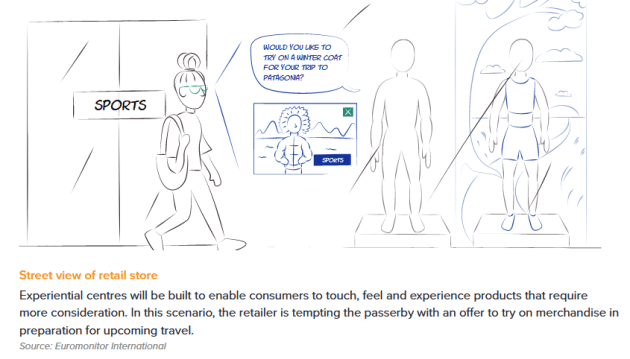Market research firm, Euromonitor International, has released a research report, Commerce 2040 – Revolutionary Tech Will Boost Consumer Engagement, which delves into how society will be living, working, shopping and playing in 2040.
Authored by the global head of digital consumer research at Euromonitor International, Michelle Evans, the report indicates that key technology – such as the 'Internet of Things', artificial intelligence and augmented and virtual reality – will have significant impacts on how consumers will conduct their daily lives.
When it comes to retailing, Evans suggests that consumer values will have shifted to place more importance on experiences rather than purchases.
According to the report, consumers will – and to some degree already do – expect a personalised experience from a brand across a multitude of screens.
Evans suggests that in the past, the retail experience was transactional, but is now one about a journey and relationship building from the beginning to the end, which adds personalised value to the consumer's shopping experience.
“The experience of being in store will evolve in the consumers’ eyes to better match the individual’s specific interest. Consumers will be able to test product claims or try products in the context of its final usage, whether it is trying on football cleats on a turf-like surface or trying on a winter coat in a cold zone.”
Evans also predicts that it won't just be the change in consumer's expectations that will impact the way that they shop in 2040, but that technology will significantly impact the layout and offering that a retail store has.
“Technological advances are increasingly detaching the purchase decision from a physical outlet. Smart retailers will leverage technology to remove the hassles of shopping for mundane purchases while tapping into the innate curiosity to see, feel and experience specific products.
“Stores will exist to sell impulse purchases and irregularly purchased convenience goods. Technology, like wearables and voice, will guide consumers throughout the store.
“Products will automatically be added to a virtual shopping cart upon selection, while robots will be leveraged for customer service and inventory management.”
According to Evans, the key features of a retail store in 2040 will be:
A change in the retail storefront
-
Retailers will be able to send alerts to consumers to notify them of new pricing, products and experiences, to an individuals wearable or voice platform.
-
Stores will have a separate entrance for those picking up online orders.
Technologically enhanced store entry and exit
-
Stores in 2040 will identify their incoming customers via facial scanning, allowing them to provide a tailored experience.
-
Payment for the product or experience will be automatically deducted when a customer leaves the store.
Dedicated testing area
-
Customers will be able to try on clothes, footwear and beauty products on a virtual reality version of themselves before buying.
-
The customer's virtual personal stylist will be able to give recommendations based on what the customer already owns or what they need to complete an outfit.
The delivery of products is also predicted to change, with the report stating that drones will deliver consumer's online orders from a neighbourhood portal to their homes – once they have been biometrically identified by their house and let inside.
The report is constructed using Euromonitor International's data and research.
To read the full report, click here.




